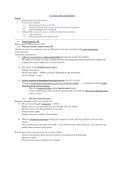Zusammenfassung
Summary L3 European History
- Kurs
- Hochschule
Abbreviations: DRTR: divine right to rule E-G: Estates-General CC: Catholic Church AR: Ancien regime DL: Germany (Deutschland) WS: Welfare state SD: Social democracy SDs: social democrats CDs: Christian democrats O1H: on the one hand OOH: on the other hand RW: right-wing LW: left-w...
[ Mehr anzeigen ]



